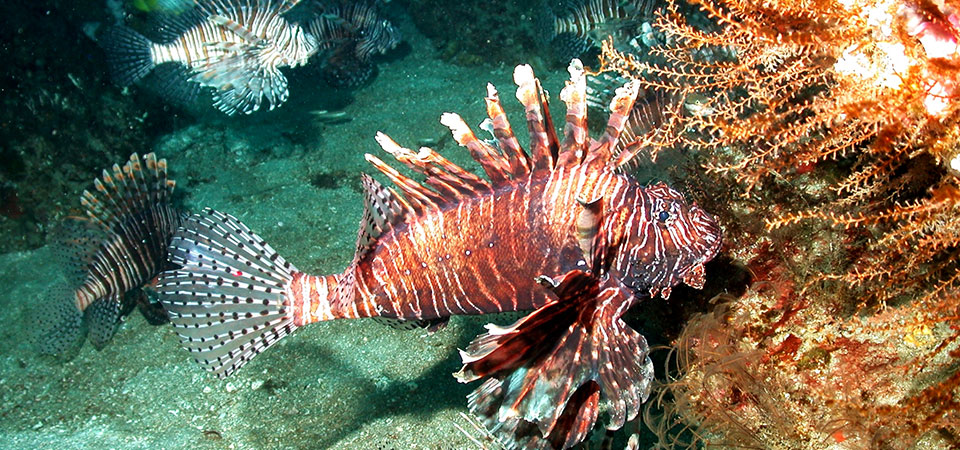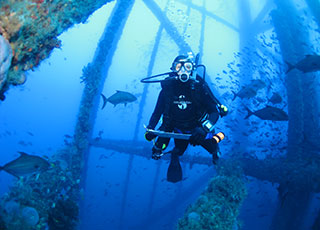Archive: Lionfish Reddit "Ask Us Anything"
In March 2017, NOAA scientists explore the lionfish invasion in our national marine sanctuaries and beyond.

Ask Us Anything!
In recent years, Indo-Pacific lionfish have been found in coral reefs throughout the southeast Atlantic, Gulf of Mexico, and Caribbean. While scientists are unsure exactly how they got there, they believe that people have been dumping unwanted lionfish from home aquariums into the Atlantic Ocean for more than two decades. Because of their voracious appetites, rapid reproduction rate, and lack of natural predators, these invasive lionfish post a serious threat to coral reefs, with potential long-term consequences for native fish communities, habitats, and entire ecosystems. This is your chance to chat with three scientists on what they know about lionfish and what NOAA is doing to address this threat during the March 3, 2017 Reddit Ask Us Anything.
Reddit "Ask Us Anything" Details (Archive)
Who: NOAA scientists Steve Gittings, Michelle Johnston, and James Morris
What: Reddit Science "Ask Us Anything." NOAA scientists Steve Gittings, Michelle Johnston, and James Morris explore the lionfish invasion in our ocean...ask them anything!
When: 3 March, 2017, at 1:00 p.m. EST
Where: On Reddit! Click here to go to the Lionfish "Ask Us Anything" page.
Meet the Scientists

Dr. Steve Gittings is chief scientist for NOAA’s National Marine Sanctuary System. He works with scientists to better understand and protect sanctuary ecosystems. His experience includes sanctuary management, deep reef and deep sea ecology, investigating ship accidents and groundings, and oil spill response. He has extensive field experience in scientific diving, ROV operations, and submersible use. Recently, Steve has been developing a trap designed to catch invasive lionfish in deep water. The trap minimizes by-catch, eliminates ghost-fishing, and could create new opportunities for fishermen to create a steady supply of lionfish to seafood and other developing markets.

Dr. Michelle Johnston is a marine biologist and NOAA dive master based at Flower Garden Banks National Marine Sanctuary, a vibrant coral reef system located in the Gulf of Mexico. She completed her B.S. in marine biology at the University of North Carolina Wilmington, and M.S. and Ph.D. degrees from the University of South Carolina, conducting water quality bacterial contaminant research at NOAA's Center for Coastal Health and Biomolecular Research. Currently, Michelle is the project manager for the sanctuary’s coral reef long-term coral monitoring program, as well as the coordinator for invasive lionfish activities. Michelle also served as the acting deputy superintendent for National Marine Sanctuary of American Samoa in 2013 where she conducted reef monitoring and combated the crown-of-thorns starfish invasion.

Dr. James Morris is an ecologist with the National Centers for Coastal Ocean Science. Dr. Morris has a bachelor’s and master’s of science in biology from East Carolina University and a Ph.D. in biology from North Carolina State University. His research focus includes invasive species and aquaculture. James has been researching lionfish since 2001. Read more about James in his People of NOS Profile.
More Information
Get Social
Did you know?
The lionfish is a carnivorous fish native to the Indo-Pacific that is now an invasive species in the Atlantic. To date, four national marine sanctuaries have been invaded by lionfish—Gray’s Reef, Florida Keys, Flower Garden Banks, and Monitor.
